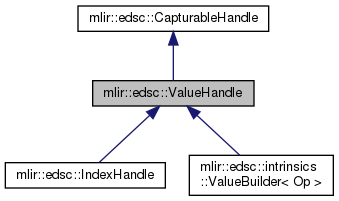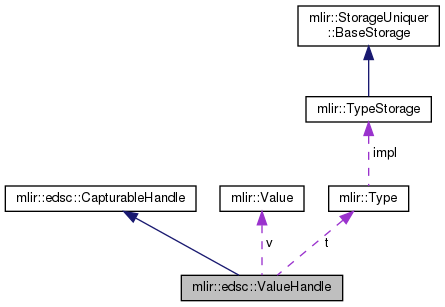#include <Builders.h>


Public Member Functions | |
| ValueHandle (Type t) | |
| ValueHandle (Value v) | |
| ValueHandle (index_t cst) | |
| ValueHandle (const ValueHandle &other)=default | |
| ValueHandle is a value type, use the default copy constructor. More... | |
| ValueHandle & | operator= (const ValueHandle &other) |
| void | swap (ValueHandle &other) |
| Provide a swap operator. More... | |
| operator Value () const | |
| Implicit conversion useful for automatic conversion to Container<Value>. More... | |
| operator bool () const | |
| bool | hasValue () const |
| Value | getValue () const |
| bool | hasType () const |
| Type | getType () const |
| Operation * | getOperation () const |
Static Public Member Functions | |
| static ValueHandle | null () |
| A ValueHandle in a null state can never be captured;. More... | |
| template<typename Op , typename... Args> | |
| static ValueHandle | create (Args... args) |
| template<typename Op , typename... Args> | |
| static ValueHandle | create (OperationFolder *folder, Args... args) |
| static ValueHandle | createComposedAffineApply (AffineMap map, ArrayRef< Value > operands) |
| Special case to build composed AffineApply operations. More... | |
| static ValueHandle | create (StringRef name, ArrayRef< ValueHandle > operands, ArrayRef< Type > resultTypes, ArrayRef< NamedAttribute > attributes={}) |
| Generic create for a named operation producing a single value. More... | |
Protected Member Functions | |
| ValueHandle () | |
 Protected Member Functions inherited from mlir::edsc::CapturableHandle Protected Member Functions inherited from mlir::edsc::CapturableHandle | |
| CapturableHandle ()=default | |
Protected Attributes | |
| Type | t |
| Value | v |
Detailed Description
ValueHandle implements a (potentially "delayed") typed Value abstraction. ValueHandle should be captured by pointer but otherwise passed by Value everywhere. A ValueHandle can have 3 states:
- null state (empty type and empty value), in which case it does not hold a value and must never hold a Value (now or in the future). This is used for MLIR operations with zero returns as well as the result of calling a NestedBuilder::operator(). In both cases the objective is to have an object that can be inserted in an ArrayRef<ValueHandle> to implement nesting;
- delayed state (empty value), in which case it represents an eagerly typed "delayed" value that can be hold a Value in the future;
- constructed state,in which case it holds a Value.
A ValueHandle is meant to capture a single Value and should be used for operations that have a single result. For convenience of use, we also include AffineForOp in this category although it does not return a value. In the case of AffineForOp, the captured Value is the loop induction variable.
Constructor & Destructor Documentation
◆ ValueHandle() [1/5]
|
inlineexplicit |
A ValueHandle that is constructed from a Type represents a typed "delayed" Value. A delayed Value can only capture Values of the specified type. Such a delayed value represents the declaration (in the PL sense) of a placeholder for an mlir::Value that will be constructed and captured at some later point in the program.
◆ ValueHandle() [2/5]
|
inlineexplicit |
A ValueHandle that is constructed from an mlir::Value is an "eager" Value. An eager Value represents both the declaration and the definition (in the PL sense) of a placeholder for an mlir::Value that has already been constructed in the past and that is captured "now" in the program.
◆ ValueHandle() [3/5]
| mlir::edsc::ValueHandle::ValueHandle | ( | index_t | cst | ) |
Builds a ConstantIndexOp of value cst. The constant is created at the current insertion point. This implicit constructor is provided to each build an eager Value for a constant at the current insertion point in the IR. An implicit constructor allows idiomatic expressions mixing ValueHandle and literals.
◆ ValueHandle() [4/5]
|
default |
ValueHandle is a value type, use the default copy constructor.
◆ ValueHandle() [5/5]
|
inlineprotected |
Member Function Documentation
◆ create() [1/3]
|
static |
Generic mlir::Op create. This is the key to being extensible to the whole of MLIR without duplicating the type system or the op definitions.
◆ create() [2/3]
|
static |
Generic mlir::Op create. This is the key to being extensible to the whole of MLIR without duplicating the type system or the op definitions. When non-null, the optional pointer folder is used to call into the createAndFold builder method. If folder is null, the regular create method is called.
◆ create() [3/3]
|
static |
Generic create for a named operation producing a single value.
◆ createComposedAffineApply()
|
static |
Special case to build composed AffineApply operations.
◆ getOperation()
|
inline |
◆ getType()
|
inline |
◆ getValue()
|
inline |
◆ hasType()
|
inline |
◆ hasValue()
|
inline |
◆ null()
|
inlinestatic |
A ValueHandle in a null state can never be captured;.
◆ operator bool()
|
inline |
◆ operator Value()
|
inline |
Implicit conversion useful for automatic conversion to Container<Value>.
◆ operator=()
| ValueHandle & mlir::edsc::ValueHandle::operator= | ( | const ValueHandle & | other | ) |
ValueHandle is a value type, the assignment operator typechecks before assigning.
◆ swap()
|
inline |
Provide a swap operator.
Member Data Documentation
◆ t
|
protected |
◆ v
|
protected |
The documentation for this class was generated from the following files:
- include/mlir/EDSC/Builders.h
- lib/EDSC/Builders.cpp
 1.8.13
1.8.13